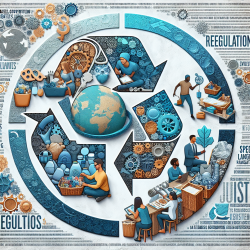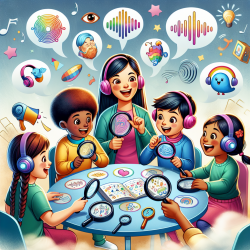Introduction
In the ever-evolving landscape of speech-language pathology, practitioners are constantly seeking innovative ways to enhance their skills and improve outcomes for children. While the connection between speech-language pathology and the circular economy might not be immediately apparent, the recent research article titled "Circular Economy and the Changing Geography of International Trade in Plastic Waste" offers valuable insights that can inspire practitioners to think beyond traditional boundaries.
The Circular Economy: A Pathway to Sustainability
The concept of a circular economy is gaining traction as a viable solution for sustainable development. It emphasizes reducing waste, reusing materials, and recycling resources to create a closed-loop system that minimizes environmental impact. This approach is particularly relevant in addressing the global plastic pollution crisis, which has far-reaching implications for our planet's health.
Key Findings from the Research
The research article delves into the complex patterns of international trade in plastic waste over the past two decades. It highlights the movement of plastic waste from high-income countries to developing nations and challenges the traditional North-South dichotomy in environmental justice discussions. The findings underscore the need for better monitoring and regulation of transboundary trade in plastic waste to ensure transparency and environmental soundness.
Implications for Practitioners
While the research primarily focuses on plastic waste trade, its implications extend beyond environmental concerns. Speech-language pathologists can draw inspiration from the circular economy model to enhance their practice in several ways:
- Resource Optimization: Just as the circular economy seeks to maximize the value of resources, practitioners can optimize their use of materials and tools to create more effective therapy sessions.
- Innovative Approaches: The research encourages practitioners to think creatively and explore innovative methods to address challenges in their field, much like the circular economy encourages innovative solutions for waste management.
- Collaboration and Networking: The interconnected nature of global trade in plastic waste highlights the importance of collaboration. Practitioners can benefit from networking and sharing knowledge with peers to enhance their skills and improve outcomes for children.
Encouraging Further Research
The research article serves as a catalyst for further exploration. Practitioners are encouraged to delve deeper into the circular economy model and its potential applications in speech-language pathology. By staying informed about emerging trends and research, practitioners can continuously refine their skills and contribute to sustainable development in their field.
Conclusion
Incorporating the principles of the circular economy into speech-language pathology practice can lead to innovative approaches and improved outcomes for children. By embracing resource optimization, collaboration, and continuous learning, practitioners can play a vital role in creating a sustainable future for their field.
To read the original research paper, please follow this link: Circular Economy and the Changing Geography of International Trade in Plastic Waste.










